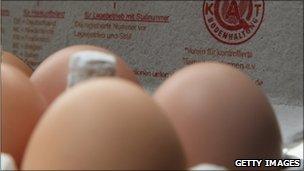Dioxin in UK eggs from Germany 'within safe levels'
- Published

Dioxin in eggs in the UK from affected German farms was "more than likely" within levels considered safe, the European Commission has said.
Eggs from Germany where animal feed has been contaminated by dioxins have been used in some British cakes and quiches.
The EU said 14 tonnes of eggs in liquid form had been exported to the UK but it was unclear if they were contaminated by the the poisonous chemical.
EU officials insisted the levels of dioxins were not a human health risk.
'Effective systems'
The European Commission said tests on batches of liquid eggs in the Netherlands, where they were sent for processing from Germany, showed dioxin levels of 0.23 picograms per gram of fat, compared to the allowed ratio of 3 picograms. A picogram is one trillionth of a gram.
A commission spokesman said: "It is more than likely the consignment which travelled through the Netherlands to the UK had a dioxin content also well below the authorised dioxin level."
The commission has called for better monitoring of the food chain by the industry - either voluntarily or through legislation.
Conservative agriculture spokesman in the European Parliament, Richard Ashworth, said: "This latest scare makes the case for effective labelling and traceability systems all the more urgent.
"In particular, there must be country of origin labelling on products so that consumers know where the products they are buying have come from.
"There should also be far more effective traceability systems set up, which would allow products to be traced directly in the case of a scare such as this. The industry needs to take the lead on this, rather than having it forced on them by EU legislation."
More than 4,700 German pig and poultry farms were closed last week as a precaution, and 558 remain locked down.
The UK's Food Standards Agency (FSA) said two UK manufacturers had used the eggs - Kensey Foods in Cornwall and Memory Lane Cakes in Cardiff.
The FSA said there was a very low risk to human health, because the eggs were diluted with other products.
The agency said that following the distribution of eggs to the Netherlands, they were mixed with non-contaminated eggs to make pasteurised liquid egg. The product was distributed to the UK.
The FSA said it did not have a "definitive list" of the supermarkets that sold the products involved, but Tesco and Morrisons were two of them.
Oils mixed
The shipment of potentially-contaminated liquid eggs came into the UK from the Netherlands in December, so the products are likely to have been eaten by now.
The alert began when it was discovered thousands of tonnes of animal feed contaminated by highly toxic dioxins had been sent to more than 1,000 poultry and pig farms in Germany.
Eggs from those farms were sent to the Netherlands for processing and then on to the UK.
The problem has been traced to oils intended for bio-fuel becoming mixed with oil destined for animal feed.
Dioxins are toxins formed by industrial processes and waste burning.
They have been shown to contribute to higher cancer rates and to affect pregnant women.
- Published7 January 2011
- Published7 January 2011
- Published7 January 2011
- Published7 January 2011
- Published7 January 2011
- Published5 January 2011
- Published4 January 2011